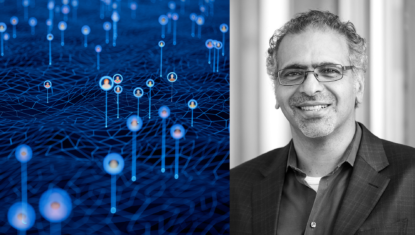25/01/2023
Ottawa, Ontario — Wednesday January 25, 2023

Platform improves access to health data and addresses privacy concerns
In conjunction with National Data Privacy Week (January 22-28, 2023), the CHEO Research Institute has launched a new software platform for generating synthetic data to improve access to electronic health record information and combined research datasets, while significantly reducing threats to privacy.
It will advance pediatric research in precision health, which requires large datasets for generation of algorithms to personalize treatments. The reduced privacy risks associated with synthetic data will also enable researchers to more easily access data normally considered sensitive to privacy issues, such as mental health information.
Created by Dr. Khaled El Emam, Senior Scientist at the CHEO Research Institute and Canada Research Chair in Medical Artificial Intelligence, and his team, the synthetic data platform applies state-of-the-art methods to solve practical problems.
“Access to health data is a significant barrier to research, particularly when working collaboratively across different institutions or jurisdictions. Protecting health information privacy is paramount, but it can also slow the research process. Disclosure risks can be very small in a synthetic dataset, eliminating a major hurdle in fast acquisition of health data, while responsibly addressing privacy concerns, and easing access to data that is the foundation of life-changing research will increase the pace of discovery and innovation,” said Dr. El Emam, who is also a professor at the University of Ottawa.
Interest and adoption of synthetic data generation methodologies has been increasing rapidly in the health sector. Generating synthetic data involves training artificial intelligence (AI) models on real data, using these models to generate new data that retain the original patterns and enable researchers to draw the same conclusions as the original data. The result is a “privacy-preserving digital twin” of the original data without a one-to-one mapping back to information about the original individuals. Therefore, the risk of privacy violations is very small.
Beyond privacy, synthetic data generation can solve other research challenges with health data. Pediatric studies are often limited by small sample sizes. Synthetic data can be used to augment the number of participants, e.g., generation of a synthetic control group for a clinical trial, which can be more efficient than recruiting participants. Health data sets from electronic health records or studies are also often biased by under-representation of population sub-groups. Synthetic data can be generated to improve the representation of these groups.
“Synthetic data can help med-tech start-ups further develop and validate new AI and machine learning technologies that are always very data hungry, without compromising privacy standards,” added Dr. El Emam, who is a taskforce member of the CHEO Research Institute’s Innovation and Commercialization Core.
Now that the CHEO Research Institute synthetic data platform is launched, the next step is to put it to real-life use. Dr. El Emam invites researchers with large datasets and innovators looking for large datasets to contact and collaborate with his team at www.ehealthinformation.ca/contact-us. Such collaborations will enable the team to optimize the platform’s capabilities and functionality within, and beyond the CHEO Research Institute. The platform was partially funded by the CHEO Foundation.
-30-
Media contact:
Jennifer Ruff
Manager of Communications
CHEO Research Institute
(613) 261-3979
[email protected]
About the CHEO Research Institute
The CHEO Research Institute coordinates the research activities of CHEO and is affiliated with the University of Ottawa. The seven programs of research at CHEO RI focus on a full spectrum of pediatric topics. Key themes include cancer, diabetes, obesity, mental health, emergency medicine, musculoskeletal health, electronic health information and privacy, and genetics of rare disease. At the CHEO Research Institute, discoveries inspire the best life for every child and youth. For more information, visit cheoresearch.ca.
